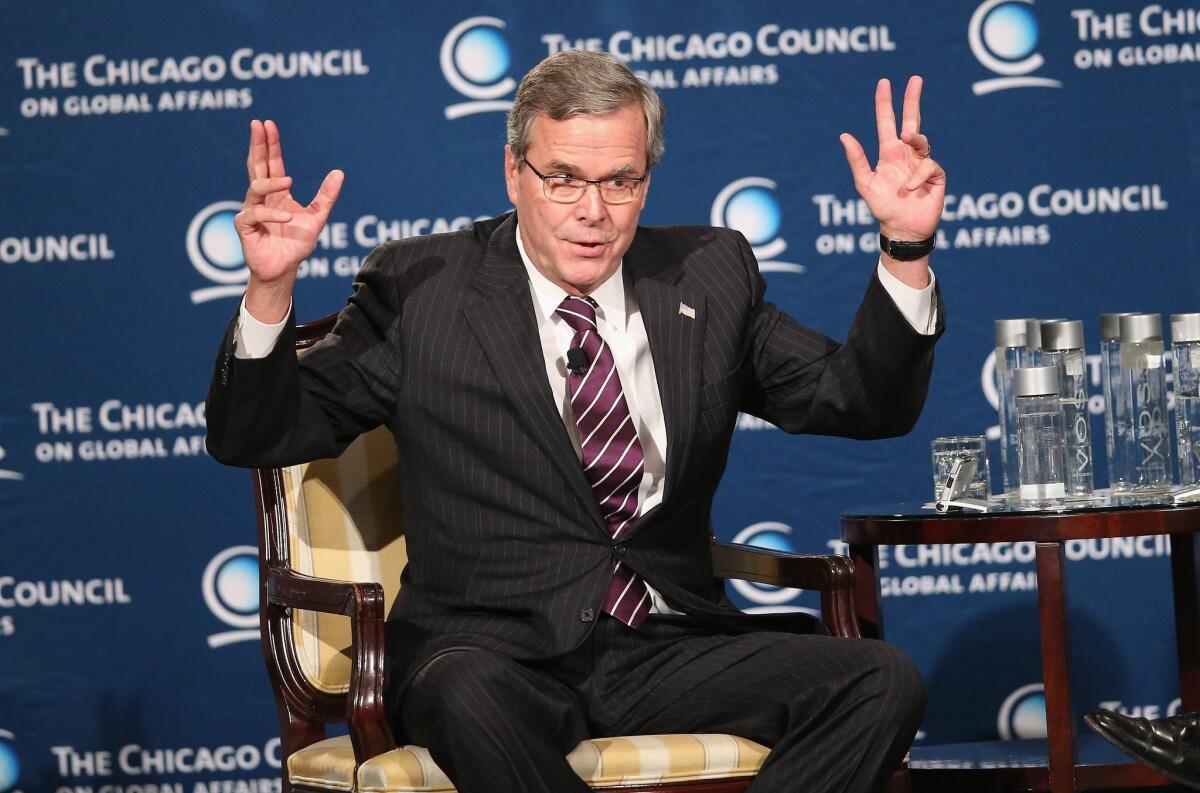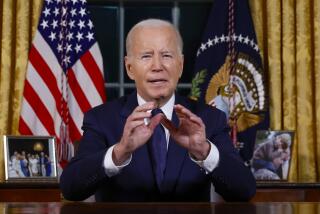Opinion: Jeb Bush says he’s different from his brother, but doesn’t say how

Jeb Bush, still not officially a presidential candidate, describes his foreign policy views before the Chicago Council on Global Affairs.
Before Jeb Bush delivered the first foreign policy speech of his not-yet-official presidential campaign on Wednesday, speculation centered on whether he would explain how he would differ from his brother, former President George W. Bush, whose record isn’t remembered fondly by most voters.
The answer was: Not very clearly.
“I love my brother; I love my dad,” Jeb Bush told the Chicago Council on Global Affairs. “But I’m my own man, and my views are shaped by my own thinking.”
“There were mistakes made in Iraq, for sure,” he said, citing mistaken intelligence assessments that Saddam Hussein was stockpiling weapons of mass destruction and the postwar failure to establish security.
He praised his brother’s decision to launch a “surge” of U.S. troops in Iraq after launching the 2003 invasion that touched off a civil war there.
But he also suggested – very gently -- that he would put less emphasis than George W. Bush did on promoting democracy overseas. “We have to be realistic,” Jeb Bush said, charging that “past presidents” had erred in thinking that “if you have an election, you’re a democracy.” Which past presidents? He didn’t say.
On one issue, though, Bush was emphatically clear: He’ll oppose any nuclear agreement with Iran that allows Tehran to continue enriching uranium, even in small quantities.
The United States and other powers have been trying to negotiate a deal that would make it impossible for Iran to develop a nuclear weapon. The negotiators have concluded that Iran will not agree to a deal that prohibits it entirely from enriching uranium -- so they’ve sought an arrangement that would allow Iran to enrich small amounts of uranium, just not to the level needed for weapons.
Bush made it clear that won’t be enough.
“Prevention of nuclear weapons in Iran was once a unifying issue in American foreign policy,” he said. “When he launched his negotiations, President Obama said [this] was his goal: Stop Iran’s nuclear program. Now we’re told the goal has changed and the point of these negotiations isn’t to solve the problem, it’s to manage it.”
Actually, the Obama administration’s main goal has always been to prevent Iran from developing a nuclear weapon; that hasn’t changed.
But Bush’s position suggests that if the administration concludes a deal, it will face ferocious opposition from every potential Republican presidential candidate – with the possible exception of Sen. Rand Paul (R-Ky.), who has defended the negotiations.
It also makes it less likely that an agreement can be reached – since Iran’s leaders have long questioned whether the next president will stick to any deal that Obama concludes.
Follow Doyle McManus on Twitter @doylemcmanus and Google+
MORE FROM OPINION:
Fan mail from Fox News defenders
Are you making a mistake raising your kids without religion? Join our live video discussion
Forget it, liberals: Elizabeth Warren is not running for president
More to Read
Start your day right
Sign up for Essential California for news, features and recommendations from the L.A. Times and beyond in your inbox six days a week.
You may occasionally receive promotional content from the Los Angeles Times.







